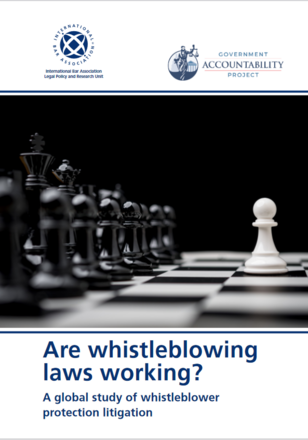This report tracks the records of whistleblower laws in 38 countries and provides an unprecedented effort to understand the successes and shortcomings of whistleblower protection legislation worldwide, following a proliferation of laws in recent decades. Co-published by the International Bar Association (IBA) Legal Policy & Research Unit (LPRU) and Government Accountability Project , the report aims to support legislators, policy-makers and regulators in designing and developing normative, institutional and judicial frameworks that effectively protect whistleblowers in law – and in reality.
From the foreword by Georgia Georgiadou, Deputy Head of the Unit on Fundamental Rights Policies, Department for Justice, European Commission:
"The meticulous collection and review of the data and case law, and the assessment, on this basis, of how these laws are actually implemented in practice, provide valuable insights into the various elements which, together, can form a comprehensive and coherent whole in which whistleblower protection laws can best ‘work’.
Distilling these findings into a set of recommended best practices – as well as lessons learned – this research is an important contribution in terms of supporting the actions of legislators and policy makers worldwide to design and develop normative, institutional and judicial frameworks that effectively protect whistleblowers in law – and in reality. In this perspective, the findings of this research are also particularly timely to support and inspire current work at the EU and national level with a view to ensuring the proper transposition of the EU Whistleblower Protection Directive to maximise its effectiveness on the ground.
The Covid-19 pandemic has brought into stark relief the urgency of improving whistleblower protection with a view to addressing serious threats to the public interest and many of the current challenges to our democracies. The cross-fertilisation of ideas and the global conversation on how best to achieve this aim, to which this study contributes, are essential means to this end".
Whistleblowers are individuals who challenge abuses of power that betray the public trust. Whistleblowing rights have become a global legal phenomenon. In 1978, no countries had national whistleblower laws; 48 do today, rising to over 62 once all Member States implement the landmark 2019 European Union Whistleblower Directive. However, too often rights that look impressive on paper are only a mirage of protection in practice. Either they do not make a difference, or in some cases, make whistleblowing more dangerous. As countries around the world seek to enact new whistleblower laws or update existing ones, it is important to know and act on lessons learned for turning these rights into reality.
Tags: Whistleblowing Media Law Legal protectionThe content of this article can be used according to the terms of Creative Commons: Attribution-NonCommercial 4.0 International (CC BY-NC 4.0) . To do so use the the wording "this article was originally published on the Resource Centre on Media Freedom in Europe" including a direct active link to the original article page.


